|
|
|
Sort Order |
|
|
|
Items / Page
|
|
|
|
|
|
|
| Srl | Item |
| 1 |
ID:
132897
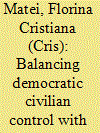

|
|
|
|
|
| Publication |
2014.
|
| Summary/Abstract |
This article reviews Romania's intelligence reform after 1989. Specifically, it looks at intelligence reform before and after Romania's accession to the North Atlantic Treaty Organization (NATO) in 2004, and the European Union (EU) in 2007. It finds that Romania has made considerable progress in intelligence reform. That is because Romania, which expressed its desire and commitment to join NATO/EU after 1989, has worked hard to comply with these organizations' membership demands (including intelligence reform). After NATO/EU integration (when demands on balancing control and effectiveness virtually vanished), despite continued openness efforts made by agencies, control/oversight diluted. Thus, post-NATO/EU, while effectiveness is being strengthened, democratic control lessens.
|
|
|
|
|
|
|
|
|
|
|
|
|
|
|
|
| 2 |
ID:
124063
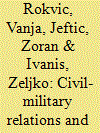

|
|
|
|
|
| Publication |
2013.
|
| Summary/Abstract |
This article focuses on the democratization of civil-military relations and the implementation of democratic control of the armed forces in the Republic of Serbia. By analyzing the basic parameters of democratic civil-military relations, we attempt to evaluate whether civil-military relations in the Republic of Serbia can be classified into a type of relations that occur in consolidated democracies. Based on an examination of legal documents and other data, this article concludes that democratic changes since October 2000 have greatly influenced the course of relations between military and political elites and that civil-military relation in Serbia meet most of the defined parameters. However, due to the difficulties in the implementation of this control in practice, civil-military relations in Serbia can only partially be classified as a type of relations that occur in consolidated democracies.
|
|
|
|
|
|
|
|
|
|
|
|
|
|
|
|
| 3 |
ID:
143283
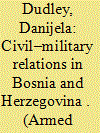

|
|
|
|
|
| Summary/Abstract |
Nearly two decades after the civil war, Bosnia and Herzegovina has yet to establish democratic control over its armed forces. While there is a widespread consensus that democratic consolidation is desirable, the process has been impeded by continuing challenges to state legitimacy. With three ethnic groups challenging state legitimacy, the reform efforts have been overshadowed by each group’s fears of others’ future intentions, leading thus to the maintenance of three armies for a decade after the war and nondemocratic defense relations to this day. The levels of challenges to state legitimacy, however, have varied. Due to the changing political environment, the early 2000s were characterized by a relative absence of nationalist rhetoric, allowing thus significant reforms of the defense sector. However, with reemergence of challenges to state legitimacy in 2006, the reform efforts came to a stalemate, leaving the newly established defense institutions without the capacity necessary for their functioning.
|
|
|
|
|
|
|
|
|
|
|
|
|
|
|
|
| 4 |
ID:
087908
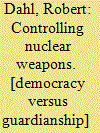

|
|
|
|
|
| Publication |
New York, Syracuse University Press, 1985.
|
| Description |
ix, 113p.
|
| Standard Number |
0185623348
|
|
|
|
|
|
|
|
|
|
|
|
Copies: C:1/I:0,R:0,Q:0
Circulation
| Accession# | Call# | Current Location | Status | Policy | Location |
| 026322 | 341.734/DAH 026322 | Main | On Shelf | General | |
|
|
|
|
| 5 |
ID:
115431
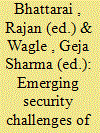

|
|
|
|
|
| Publication |
kathmandu, Nepal Institute for Policy Studies, 2010.
|
| Description |
iv,464p.
|
| Standard Number |
9789937228596
|
|
|
|
|
|
|
|
|
|
|
|
Copies: C:1/I:0,R:0,Q:0
Circulation
| Accession# | Call# | Current Location | Status | Policy | Location |
| 056840 | 355.03305496/BHA 056840 | Main | On Shelf | General | |
|
|
|
|
| 6 |
ID:
137626
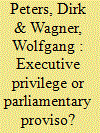

|
|
|
|
|
| Summary/Abstract |
Parliamentary oversight of the military constitutes an important element of the civilian control of the armed forces. However, the strength of parliaments in this realm varies greatly across democracies and little is known about the sources of this variation. We propose an explanation for one key aspect of this variation: why does parliament enjoy veto power over military deployments in some democracies but not in others? Our analysis of data from forty-nine democracies around the world suggests that at least three factors account for parliamentary strength or weakness in this realm: the external threat to which a country is exposed, its constitutional tradition, and the experience of severe military failure in the past.
|
|
|
|
|
|
|
|
|
|
|
|
|
|
|
|
| 7 |
ID:
164181
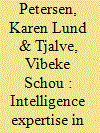

|
|
|
|
|
| Summary/Abstract |
The emergence of a more elusive and uncertain threat environment has transformed the nature of intelligence, increasing its reliance on civil society partners. Once the work of an insular and carefully select few, intelligence production is now a networked, partially open and extensively public–private enterprise. Most poignantly, new practices of public–private ‘collection’ face Western intelligence services with novel questions about control and accountability – questions to which the services have responded with hopes that by standardizing ‘methodologies’, central command may be retained. Suggesting a more complex picture, this article argues that ‘managing uncertainty’ imply forms of interpretation and choices which cannot be pre-empted by rule-regulation: more than Weber’s ideal of the procedural and rule-bound, it may be his (once central, yet largely marginalized) emphasis on institutional and individual capacities for critical ‘judgment’ that is of relevance today.
|
|
|
|
|
|
|
|
|
|
|
|
|
|
|
|
| 8 |
ID:
139509
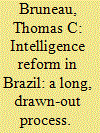

|
|
|
|
|
| Summary/Abstract |
In our edited book, Reforming Intelligence: Obstacles to Democratic Control and Effectiveness, Steven Boraz and I argued that intelligence should be analyzed as a subset of civil–military relations. In addition to the three reasons given there—that intelligence is a monopoly of the military in most non-democratic regimes; that even in older democracies including the United States the military plays a very large role in intelligence; and that both exist to ensure national security—another can be added, at least in the case of Brazil, that while democratic civilian control has been achieved, minimal attention and commitment are given to achieving effectiveness.
|
|
|
|
|
|
|
|
|
|
|
|
|
|
|
|
| 9 |
ID:
134065
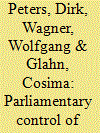

|
|
|
|
|
| Publication |
2014.
|
| Summary/Abstract |
Parliamentary involvement remains a key tool for the democratic control of executive policies. This article explores the web of parliamentary involvement in decision-making on European Union (EU) military operations, using insights gained in an in-depth case study on the EU's anti-piracy mission Atalanta. We find that parliaments at all levels became involved only after key political decisions had already been made. At the member state level, we find highly uneven involvement with only some parliaments being very well informed and closely monitoring, if not influencing government policy. The European Parliament became active only after the launch of the mission but then scrutinised it intensely, profiting (in contrast to national parliaments) from its access to top military officials and key decision-makers. Finally, transnational parliamentary assemblies as well as more informal networks provided opportunities to transmit information across the boundaries of individual parliaments and party-groups thus potentially enhancing the ability of parliamentarians to scrutinise government policies.
|
|
|
|
|
|
|
|
|
|
|
|
|
|
|
|
| 10 |
ID:
056140
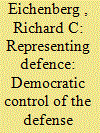

|
|
|
|
|
|
|
|